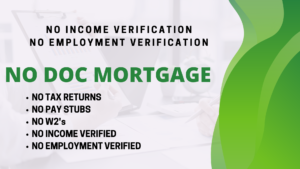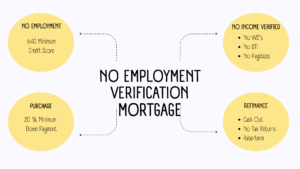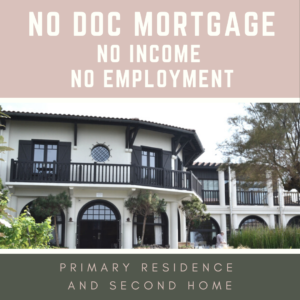No Income Verification Mortgage: A Simplified Guide
In recent years, the mortgage industry has witnessed significant changes, leading to the introduction of various mortgage options tailored to suit different financial situations. One such option gaining popularity is the “No Income Verification Mortgage.”
This article aims to provide a comprehensive understanding of what a no income verification mortgage entails, how it works, its pros and cons, and who may benefit from this type of home loan. So, if you’re curious to explore this alternative path to homeownership, keep reading.

CALL 888-958-5382 or APPLY NOW!!
Understanding No Income Verification Mortgages
What is a No Income Verification Mortgage?
A No Income Verification Mortgage, also known as a “stated-income” or “no-doc” loan, is a type of home loan that offers an alternative approach to the traditional mortgage application process.
Unlike conventional mortgages where borrowers are required to provide extensive documentation of their income, such as pay stubs, tax returns, and W-2 forms, a no income verification mortgage allows borrowers to state their income instead of providing detailed proof.
In the case of a no income verification mortgage, the lender evaluates other financial factors, such as the borrower’s credit score, assets, and employment history, to assess their creditworthiness.
This type of mortgage is particularly useful for individuals with non-traditional income sources, such as self-employed individuals, freelancers, entrepreneurs, and commission-based earners, who may find it challenging to provide standard income documentation due to fluctuating or variable income streams.
How Does It Work?
A No Income Verification Mortgage works by providing an alternative method for evaluating a borrower’s creditworthiness and ability to repay the loan. Unlike traditional mortgages, where borrowers must provide detailed income documentation, a no income verification mortgage relies on other financial factors to assess eligibility.
Here’s how a no income verification mortgage typically works:
-
Application Process:
- Borrowers interested in a no income verification mortgage start by applying with a lender. During the application, they need to provide basic personal and financial information, such as employment history, assets, credit score, and the property they wish to purchase.
-
Stating Income:
- Instead of submitting pay stubs, tax returns, or W-2 forms, borrowers “state” their income to the lender. This means they provide an estimate or self-reported figure for their earnings.
-
Evaluation of Other Financial Factors:
- The lender focuses on other financial aspects to assess the borrower’s creditworthiness. These factors may include the borrower’s credit score, employment history, and the amount of assets they have. The goal is to determine the borrower’s ability to manage the mortgage payments based on these factors.
-
Risk Assessment:
- Since no income verification mortgages carry higher risk for lenders, they often come with higher interest rates to offset this risk. The interest rate is typically determined by the borrower’s creditworthiness and other financial indicators.
-
Limited Loan Amount:
- The loan amount that borrowers can qualify for in a no income verification mortgage may be limited compared to traditional mortgages. This limitation helps mitigate risks for both the borrower and the lender.
-
Borrower Responsibility:
- Despite the simplified application process, borrowers are responsible for ensuring that they can afford the mortgage they are applying for. Honest disclosure of their financial situation is essential to avoid any potential financial difficulties in the future.
-
Limited Lender Options:
- Not all lenders offer no income verification mortgages, so borrowers may need to search for lenders who specialize in providing this type of loan.

Types of No Income Verification Mortgages
There are several types of no income verification mortgages designed to cater to borrowers with varying financial situations. These mortgages offer alternatives to traditional income documentation requirements and provide more flexibility for individuals with non-traditional income sources.
Here are the common types of no income verification mortgages:
-
No Income, No Asset (NINA) Loans:
- NINA loans require minimal documentation of both income and assets. Borrowers simply state their income and assets without providing any supporting documentation. These loans are suitable for individuals who prefer not to disclose their financial details or have difficulty verifying their income.
-
No Ratio Loans:
- No ratio loans focus on the borrower’s debt-to-income (DTI) ratio rather than income verification. The lender calculates the DTI ratio by comparing the borrower’s total monthly debts to their stated income. This type of loan is beneficial for borrowers with substantial assets or a strong credit history but may not have consistent income documentation.
-
Bank Statement Loans:
- Bank statement loans rely on the borrower’s bank statements to determine their income and ability to afford the mortgage. Self-employed individuals, freelancers, and small business owners with fluctuating income can benefit from this type of mortgage.
-
Stated-Income/Stated-Asset (SISA) Loans:
- SISA loans require borrowers to state their income and assets, but the lender does not verify the information. These loans are suitable for borrowers with excellent credit scores and a substantial down payment.
-
No Income Verification Home Equity Loans:
- Similar to the above options, this type of loan is specifically for accessing home equity without extensive income verification. Borrowers may utilize their home equity for various purposes, such as debt consolidation or home improvements.

CALL 888-958-5382 or APPLY NOW!!
Pros and Cons of No Income Verification Mortgages
No income verification mortgages offer certain advantages and disadvantages that borrowers should carefully consider before deciding whether this type of home loan is suitable for their financial situation. Let’s explore the pros and cons:
Pros of No Income Verification Mortgages:
-
Simplified Application Process:
- One of the main benefits of no income verification mortgages is the simplified application process. Borrowers are not required to provide extensive income documentation, reducing the paperwork and making the approval process faster and more convenient.
-
Ideal for Self-Employed Individuals:
- For self-employed individuals, freelancers, entrepreneurs, and small business owners, proving a stable income can be challenging due to variable earnings. No income verification mortgages offer a viable solution, making homeownership more accessible for this demographic.
-
Privacy:
- Some borrowers value their financial privacy and may prefer not to disclose detailed income information. With no income verification mortgages, borrowers can state their income without the need for providing comprehensive documentation.
Cons of No Income Verification Mortgages:
-
Higher Interest Rates:
- Due to the increased risk for lenders, no income verification mortgages often come with higher interest rates compared to traditional mortgages. Borrowers may end up paying more in interest over the life of the loan.
-
Limited Options:
- Not all lenders offer no income verification mortgages, reducing the pool of available options for borrowers. As a result, they may have fewer choices when searching for the most suitable loan terms.
-
Potential for Misrepresentation:
- Stated-income loans have faced criticism for potential abuse, as some borrowers may exaggerate their income to qualify for a larger loan. This can lead to higher default rates and financial challenges for both the borrower and the lender.
-
Higher Risk for Borrowers:
- While these loans may be suitable for some individuals, others may take on more significant financial risks than they can handle. Without a thorough income assessment, borrowers may unknowingly commit to a loan they cannot afford in the long term.
-
Possible Difficulty in Refinancing:
- If borrowers with no income verification mortgages wish to refinance their loans later on, they might encounter challenges, as most refinance options require detailed income documentation

Who Can Benefit from No Income Verification Mortgages?
No income verification mortgages can be beneficial for specific groups of individuals who may face challenges in providing traditional income documentation. Here are the types of people who can benefit from these types of home loans:
-
Self-Employed Individuals:
- Self-employed individuals, such as freelancers, contractors, and small business owners, often have variable income streams that can be difficult to verify using standard income documentation. No income verification mortgages offer a viable option for these individuals to access homeownership.
-
Freelancers and Gig Workers:
- Freelancers and gig workers often have irregular income and may find it challenging to meet the strict income verification requirements of conventional mortgages. No income verification loans accommodate their unique financial situations.
-
Commission-Based Earners:
- Sales professionals, real estate agents, and others who earn the majority of their income through commissions might struggle to provide consistent income documentation. No income verification mortgages consider other financial factors to assess creditworthiness.
-
Seasonal Workers:
- Individuals who work in industries with seasonal income fluctuations may benefit from no income verification mortgages. These loans take into account the overall financial picture, rather than relying solely on verified income during certain months.
-
Retirees:
- Retirees who have significant assets but limited income streams may find it challenging to qualify for traditional mortgages. No income verification loans that assess assets and creditworthiness can be a suitable option for them.
-
Investors and Real Estate Professionals:
- Investors and real estate professionals who own multiple properties or have complex financial situations may find it easier to qualify for additional mortgages through no income verification loans.
-
Recent Graduates or Career Changers:
- Individuals who have recently graduated or changed careers might not have a long employment history with consistent income. No income verification mortgages can be a viable option for them during this transitional period.
-
Foreign Nationals:
- Non-U.S. citizens who lack a U.S.-based income history may find it challenging to provide income verification for traditional mortgages. No income verification loans can help them access the housing market.

CALL 888-958-5382 or APPLY NOW!!
Conclusion
A no income verification mortgage can be a practical choice for individuals with non-traditional income sources or those seeking a simpler home loan application process. However, it’s essential to weigh the pros and cons carefully and consider individual financial circumstances before opting for this type of mortgage.
Consulting with a qualified mortgage professional will help potential borrowers make an informed decision that aligns with their long-term financial goals.
FAQs About No Income Verification Mortgages
1. Are No Income Verification Mortgages Risky?
No income verification mortgages may carry higher risk for lenders due to the limited financial documentation. As a result, they typically come with higher interest rates. Borrowers should assess their ability to repay the loan responsibly.
2. Can I Get a No Income Verification Mortgage with Bad Credit?
While credit requirements may vary between lenders, having a strong credit score can increase your chances of approval for a no income verification mortgage. However, applicants with bad credit may still find it challenging to secure such loans.
3. Can I Use a No Income Verification Mortgage for Investment Properties?
Yes, some lenders offer no income verification mortgages for investment properties. However, qualifying for these loans might be more stringent compared to primary residences.
4. Are No Income Verification Mortgages Available for Refinancing?
Yes, borrowers may consider refinancing their existing mortgages into a no income verification mortgage if they meet the lender’s criteria. It’s crucial to evaluate the potential costs and benefits of such a move.
5. How Can I Avoid Misusing a Stated-Income Loan?
To avoid misrepresentation and potential financial pitfalls, borrowers should be honest about their income and consider their long-term financial goals before committing to a no income verification mortgage.
CALL 888-958-5382 or APPLY NOW!!

Mortgage-World.com
Comments are closed.